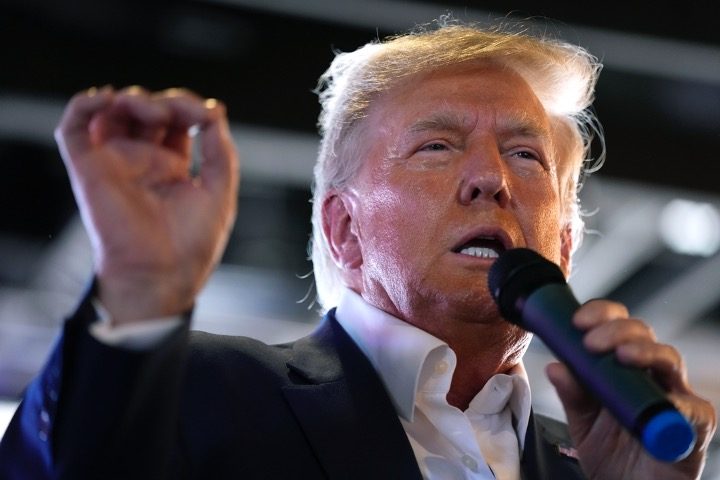
The 14th Amendment to the United States Constitution is a critical piece of legislation that has played an unparalleled role in shaping the legal and cultural landscape of the United States, particularly in matters related to citizenship, due process, and equal protection under the law. One of its sections, Article 3, has been subject to debate recently, with some notable conservative legal analysts insisting that it could be applied to former President Donald Trump, preventing him from running for president because of his alleged involvement in the events at the Capitol on January 6, 2021. In this article, I will carefully examine the language and intent of Article 3 and present a compelling case for why it does not apply to Donald Trump, and thus would not prevent him from running for president in 2024.
Before that analysis, however, I would like to point out to the reader that there are serious, substantial, and scholarly sound arguments regarding whether the 14th Amendment was legally ratified. I have covered that topic here and would encourage the reader to refer to that article for additional context on the current topic.
Understanding Article 3:
Article 3 of the 14th Amendment states:
No person shall be a Senator or Representative in Congress, or elector of President and Vice President, or hold any office, civil or military, under the United States, or under any State, who, having previously taken an oath, as a member of Congress, or as an officer of the United States, or as a member of any State legislature, or as an executive or judicial officer of any State, to support the Constitution of the United States, shall have engaged in insurrection or rebellion against the same, or given aid or comfort to the enemies thereof. But Congress may by a vote of two-thirds of each House, remove such disability.
The language of Article 3 is clear and specific. It establishes that individuals who have taken an oath to support the Constitution of the United States and subsequently engaged in insurrection or rebellion against it are barred from holding certain offices, both at the federal and state levels, including president of the United States. The original intent behind this provision was to address the aftermath of the Civil War and to prevent former Confederates from holding public office unless they were pardoned by a two-thirds vote in Congress.
Application to Donald Trump:
The key question is whether Article 3 can be applied to Donald Trump based on his intent, actions, and statements relating to the events of January 6, 2021. While some critics have argued that his rhetoric and actions relating to his encouraging or inciting or even approval of the actions of others on January 6, 2021 qualify as insurrection or rebellion — which would disqualify him from serving as president — a careful analysis reveals that these elements do not meet the criteria set forth in Article 3 and would not keep him from seeking a second term as president.
Insurrection or Rebellion:
The events on January 6, 2021 undoubtedly involved on the part of some of the participants trespass into the U.S. Capitol, destruction of some property, and various acts of violence. However, legal definitions of insurrection or rebellion require a coordinated and organized effort to overthrow the government. While some of Trump’s supporters participated in the breach, there is no clear evidence that Trump himself directly incited or organized the attack. Additionally, there is no evidence that Trump anticipated that anyone involved in the events of January 6 would be marching on the Capitol with the intent of overthrowing the government. In fact, it has never been proven that anyone who participated in the January 6 attacks out of genuine frustration with the federal government (in other words, not counting the federal agents who have been alleged to have played a role in riling up the rest of the protesters) actually expressed any desire or made any overt attempt to do anything even approximating an overthrow of the federal government. Moreover, there is no convincing evidence that anyone who has been prosecuted for involvement with the January 6 events felt compelled or commanded to do so by Donald Trump.
Additionally, it must be asked whether anyone who might have been encouraged to enter the Capitol on January 6, 2021 by something Donald Trump said believed that the purpose of that demonstration was to overthrow the government, as would be required to sustain a charge of insurrection or rebellion. Such a suggestion is farcical in light of the findings of the congressional committee that investigated the events of January 6, as well as the actual outcome of those events.
Aid or Comfort to Enemies:
Article 3 also prohibits from holding office an individual who has provided aid or comfort to enemies of the United States. This typically pertains to individuals who provide material support to foreign adversaries during times of war. While critics argue that Trump’s actions may have inspired some people to set about protesting against established political institutions, none of those actions — of Donald Trump or those who may have been motivated by his words — meet the legal threshold for aiding or comforting enemies as specified in the 14th Amendment.
Mind you, anyone arguing that in fact “enemies” were aided or comforted by words spoken by Donald Trump must admit that the people are the enemy of the federal government and must then wonder why a government whose legitimacy depends on their preserving and protecting the life, liberty, and property of the people would be in fear of the people. Why would a faithful employee fear an employer whose business is made more prosperous by that employee’s work?
If the government genuinely fears violent uprisings (insurrections) of the people, if the people truly have become the enemy of the government, then there are more critical questions to be considered than whether Article 3 of the 14th Amendment might apply to Donald Trump. There is something more fundamental to the future of this union and the protection of the public peace than anything Donald Trump did or did not do if we, the people, now feel forced to make attacks on our political servants.
Oath and Intent:
To trigger the application of Article 3, an individual must have taken an oath to support the Constitution, have subsequently engaged in insurrection or rebellion, and then seek to become “a Senator or Representative in Congress, or elector of President and Vice President, or hold any office, civil or military, under the United States, or under any State.” Trump’s potential role as president of the United States does not align with the framework outlined in Article 3, as he would not be a member of Congress, an officer of the United States, or any state-level legislative, executive, or judicial officer.
That isn’t to say that there aren’t those who argue that Article 3 does apply to the president and vice president. Some argue that it would be irrational to believe that someone guilty of inciting or participating in an insurrection would be prevented from serving in Congress, but permitted to serve as president.
This very point was made, in fact, by some congressmen debating whether or not to send the 14th Amendment to the states for their consideration. On May 30, 1866, Senator Reverdy Johnson (D-Md.) asked, speaking of men who held office under the Confederacy:
I do not see but that any one of these gentlemen may be elected President or Vice President of the United States, and why did you omit to exclude them? I do not understand them to be excluded from the privilege of holding the two highest offices in the gift of the nation.
In response to this question, Senator Lot Morrill of Maine said, “Let me call the Senator’s attention to the words ‘or hold any office, civil or military, under the United States.’”
In other words, there are those that argue that no one in Congress or in the country at large in 1866 would have believed that Section 3 was meant to prevent someone from being a congressman, but allow him to be president.
Other legal and constitutional scholars, however, make a very persuasive point of placing the presidency outside of the scope of Section 3 of the 14th Amendment.
In an article published in the NYU Journal of Law and Liberty in 2021 entitled “Is the President an ‘Officer of the United States’ for Purposes of Section 3 of the Fourteenth Amendment?” Josh Blackman and Seth Barrett Tillman argue that the offices of president and vice president are not “officers of the United States” as that phrase is used in Section 3. They write:
There is a pragmatic rationale that explains why the presidency and vice presidency were excluded from the jurisdictional element of Section 3. By the time the Fourteenth Amendment was approved in 1868, there were no living Presidents that had supported the Confederacy. Tyler had already died in 1862…. The other four living former Presidents — Fillmore, Pierce, Buchanan, and Johnson — had not supported the Confederacy…. Moreover, Breckinridge, the former Vice President of the United States who joined the Confederacy, had previously served as a U.S. Senator. Therefore, he was already clearly covered by Section 3’s jurisdictional element…. Thus, the Framers of the Fourteenth Amendment — whose focus was on past wrongdoing during the Civil War — had no pressing reason to draft Section 3’s jurisdictional element to cover [former or future] U.S. Presidents.
Regarding a former president being subject to the 14th Amendment’s restrictions, such an argument is persuasive, given that there is already in the Constitution a provision for punishing a president: impeachment and conviction leading to removal and disqualification from office. If the framers of the Constitution had intended otherwise, then they would have simply written in Article II, Section 4 that “any officer of the United States” could be impeached and convicted, rather than listing as three distinct entities: “The President, Vice President, and all civil officers of the United States” as potential subjects of impeachment.
Conclusion:
Article 3 of the 14th Amendment serves a crucial purpose in safeguarding the integrity of the U.S. government by preventing individuals who have actively engaged in insurrection or rebellion from holding public office. While the events of January 6, 2021 were undoubtedly troubling and, as I wrote above, raised considerable concerns about the future of the United States of America and the Constitution that created that union, the legal criteria outlined in Article 3 do not squarely apply to former President Donald Trump. He was not holding a triggering office at the time he allegedly encouraged the January 6 demonstrations, he has not been proven to have incited an insurrection or rebellion, and nothing he has done qualifies as having given aid or comfort to the enemies of the United States.
The application of any and all constitutional provisions should always be approached with precision and careful consideration of the language, intent, and historical context of those provisions. In the case of Article 3 of the 14th Amendment, it is clear that its requirements were crafted with a specific historical context in mind. A thoughtful, nonpartisan, and objective legal analysis reveals that Donald Trump’s actions do not meet the threshold set by this provision, and they are not within the context of the historical purpose for adding this provision to the U.S. Constitution.
As we navigate the complex landscape of constitutional law, it is imperative that we remain steadfast in our commitment to fair and accurate interpretations and applications, and to appreciate the implications of those interpretations and applications, even when dealing with contentious and high-profile people and the charges being made against them. In other words, although former President Donald Trump is a frequent target for persecution and prosecution, there is no reasonable basis for preventing his election to the presidency by applying Section 3 of the 14th Amendment.



